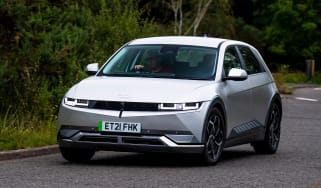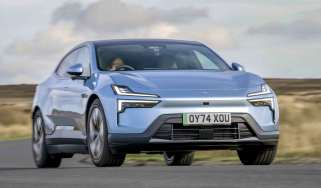UK 2030 petrol and diesel sales ban: what is it and what cars are affected?
Labour has brought forward the ban on the sale of new petrol and diesel cars – we explain what it means for you and your motor
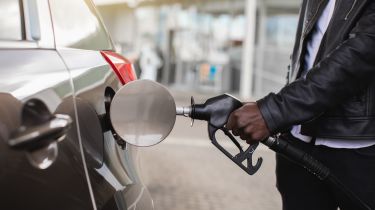
Over the past few months, the Government has repeatedly stated that it would stick to its pre-election commitment to end the sale of new petrol and diesel internal combustion-engined (ICE) cars in the UK in 2030. However, there’s a lot of confusion about what this actually means.
For example, the previous Conservative administration led by Prime Minister Rishi Sunak had tweaked the original 2030 deadline, instead promising to end the sale of petrol and diesel cars in 2035. Labour’s plan incorporates both the 2030 and 2035 deadlines, but these only apply for specific vehicles – we’ll get into that in a moment.
Already confused? We don’t blame you, so keep reading for all you need to know about the petrol and diesel ban. If you want to know how the government plans to phase out ICE vehicles and force you to buy electric, our guide to the ZEV Mandate outlines all you need to know in that regard.
2030 or 2035, how will the ban work?
IN a nutshell, there are two deadlines to worry about when talking about the UK’s transition to zero-emission vehicles: 2030 and 2035. From 2030, no new pure-petrol and diesel cars will be allowed to be sold in the UK, but a result of the Government’s recent consultation, full-hybrids such as the Honda Civic, and plug-in hybrids like the new Toyota Prius will be allowed, alongside electric and hydrogen vehicles from this point, but mild-hybrids won’t.
Then comes the 2035 deadline, which means all new cars sold in the UK will have to emit zero tailpipe emissions, so that means you’ll only be able to buy electric and hydrogen cars, provided there are any of the latter on sale and the infrastructure to support them.
Second-hand cars will be unaffected by the ICE (internal combustion engine) ban, and may be bought and sold freely just as now. That means that very many older petrol and diesel cars, plus conventional hybrids and plug-in hybrid models, are likely to be in use long after the 2035 deadline for selling new ones.
One thing worth mentioning is that small-volume manufacturers, such as sports car makers like Ferrari and Aston Martin, plus bespoke builders such as Morgan, will be exempt from such restrictions until further notice. Those registering less than 2,500 vehicles in the UK per year won’t have to conform to the bans, but those registering more than 1,000 will still need to meet some form of emissions regulations.
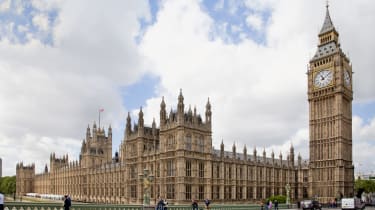
Limited Government help for the electric car transition
To help facilitate the transition away from fossil-fuel cars in the UK, £1.3billion of investment was announced in 2020 to fund EV chargepoints for homes, streets and motorways across England. A further £582million was set aside for grants to help people and businesses into EVs and PHEVs. The Government is also investing in battery development and mass production, while more money was earmarked for nuclear power plants, partly to help meet the growing demand for electricity the growing number of EVs will bring.
However, even though car makers will be mandated by law to sell increasing numbers of EVs – under the terms of the current ZEV Mandate, manufacturers have to ensure that these account for 28 per cent of their UK sales, rising to 80 per cent by 2030 – or face financial penalties. The Government has so far resisted industry calls to incentivise EV buyers with taxpayers’ cash.
Since the Government withdrew the UK plug-in car grant in 2022, there have been no financial incentives offered to private buyers of EVs. Meanwhile, company car buyers are offered major benefit-in-kind advantages if they choose an EV over a petrol or diesel alternative. This has led to booming EV registrations by fleet users, while demand for EVs among private buyers has fallen back.
Background to the petrol and diesel ban: how we arrived at 2030
The shifting sands of future policy saw a consultation launched in 2020 to investigate if a ban in 2035, "or earlier if a faster transition appears feasible” should be introduced, with hybrids included in the proposals. Both 2035 and an earlier date were clearly deemed 'feasible' by the Government following that review and the 2030 date was announced in 2020, with some wiggle room for plug-in hybrids with 'significant' electric range. Rishi Sunak’s administration, faced by the cost of living crisis and the prospect of a voter backlash, chose to reset the government’s net zero strategy to 2035. Labour made a manifesto pledge to overturn that decision and return to a 2030 ban, albeit now incorporating an exemption for hybrids.
The ban on petrol and diesel cars is part of a wider multi-billion-pound ‘Green Industrial Revolution’ that the Government hopes will create 250,000 jobs as the country invests more in battery technology, carbon capture and green energy. The UK’s “industrial heartlands, including in the North East, Yorkshire and the Humber, West Midlands, Scotland and Wales”, will be key to the coming changes, with 50,000 jobs, and £1billion of investment in “areas such as the Humber, Teesside, Merseyside, Grangemouth and Port Talbot” alone.
Your petrol and diesel ban questions answered:
We answer your key questions regarding the ban on petrol and diesel cars...
What should I do about the ban?
It’s a tricky time for consumers to make decisions about their car ownership situation. Not only are there the changes to what cars are going to be available to buy new in the coming years, but other factors – including the cost of living crisis, supply-chain issues and inflated prices – also come into play.
Making the leap to an electric car will certainly make sense for some drivers. If you can afford to pay the premium and don’t travel longer distances on a regular basis, then there is a great range of highly desirable options for you to choose from. While an exemption from road tax ended in April 2025, company car tax rates remain highly favourable for EVs, which has so far been a large part of their appeal.
Buying a new petrol or diesel car while you still have the chance to do so will appeal to many. And if you fit into this category, a brand-new ICE car will cost less than its electric equivalent, plus you won’t have to worry about the charging infrastructure, as you would with an electric vehicle, or clean-air zones as you might with an older car. There is no prospect of any kind of ban on the use or sale of existing petrol and diesel cars. The ICE ban only applies to the sale of new models.
Of course, many of us don’t have the budget for a new car. It might be that you want to keep your old one going, but are worried about being affected by a clean-air zone. If so, the second-hand market is an option. Used electric cars are in more plentiful supply and modern petrol and diesel models will still avoid Ultra Low Emissions Zone charges.
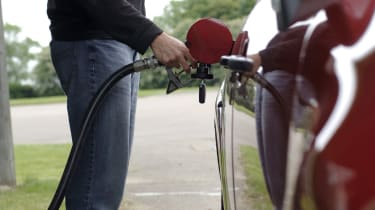
Can I still drive a petrol and diesel car after 2030?
Yes. The bans on these dates only apply to sales of new cars, and there are no current plans to outlaw the use or sale of second-hand cars based on these criteria. However, that’s not to say that more and more cities won’t start adopting schemes such as the London Congestion Charge and ULEZ, which penalise drivers for not driving green vehicles.
Electric cars are still too expensive, though. Will anything be done to bring prices down?
Electric cars are significantly more expensive than conventional ones at present, a situation that wasn't helped by the end of the UK plug-in car grant, but the difference is narrowing. It can be difficult for manufacturers to turn a profit on some EVs, but looking forward to the next decade, it’s possible that increased manufacturing volumes and economies of scale will see this improve and prices come down. We’re already seeing increased competition in the market and new brands arriving from China pushing the prices of EVs lower.
I don’t have off-street parking. How will I charge an electric car?
A number of solutions exist or are in development for this. Chargers that pop out from the kerb, lamp post chargers and cross-pavement gulleys are three such options. Furthermore, as the number of electric vehicles in the country increases, so too will charging stations. Expect these to become more commonplace at supermarkets, pubs and restaurants, cinemas, leisure centres and other locations over the next decade.
A change of mindset will also be required, with EV users highlighting the approach people take to charging their smartphones as being similar to topping up EVs: rather than always doing big overnight charges, for example, regular top-ups at ultra-rapid hubs will keep people’s cars moving.
Click here to discover how you can charge an electric car at home without a driveway...
I cover above average mileages. Will my journeys take longer?
The average UK motorist drives around 21 miles a day, but many people do more. EV ranges are commonly increasing, however, with 200-300 miles from a single charge a realistic figure for many modern electric cars. Journeys of such length would typically bring with them pit-stops at motorway services, where ultra-rapid charging can add a useful amount of range in as little as 15 minutes.
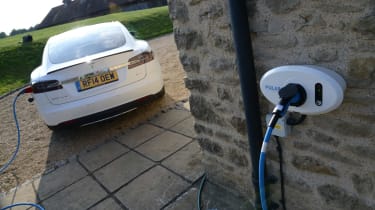
I’m a van driver. How will the ban affect me?
Van drivers not wanting to go electric quite yet can let out a sigh of relief as there will be very little restriction on the sales of petrol and diesel models until 2035. As with with cars, manufacturers simply need to meet a specific quota set by the ZEV Mandate (although this is much lower for vans) and ensure that the overall emissions of their output does not exceed what it was back in 2021.
Click here to discover the best electric vans on the market...
What about National Grid? Can the UK’s electricity supply cope with all these extra EVs?
Indications are that this will not be a problem. There are around 30 million petrol and diesel cars in the UK, but these will not be replaced overnight, and the phase-in of EVs will be gradual. Assuming new-car sales figures continue at their current pace of roughly two million a year, it’ll be 15 years before the UK’s petrol and diesel cars are replaced.
National Grid has previously stated that “enough capacity exists” for the transition to EVs, while its modelling predicts that even if all the UK’s cars became electric overnight, demand would only increase by 10 per cent.
Tell us which new car you’re interested in and get the very best offers from our network of over 5,500 UK dealers to compare. Let’s go…
Find a car with the experts




